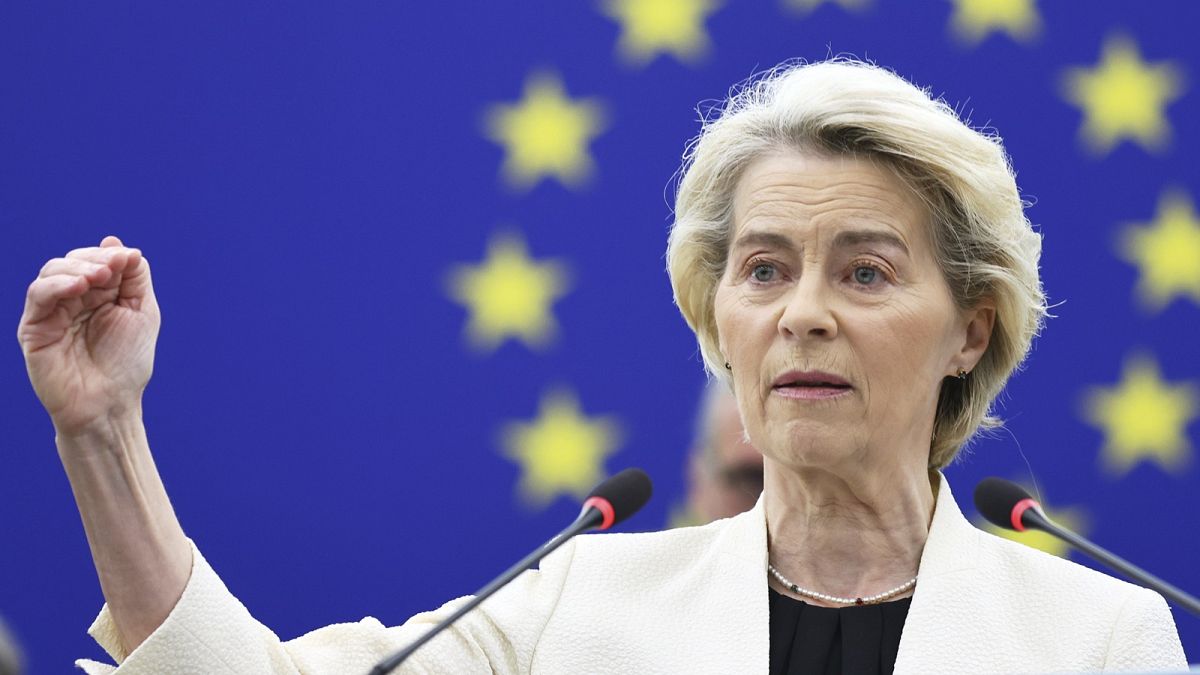The EU wants to be able to protect itself, alone, from a potential attack from 2030, but defence SMEs have faced challenges to access financing for years.
When an energy company refused to negotiate contracts for one of its energy-intensive branches because of its defence activities, the large Western European defence company concerned called the national government, one of its good clients for the military capabilities it produces, and got the problem sorted quickly.
Some of their smaller suppliers, however, are not so lucky.
“Their local banks often refuse giving them bank accounts or loans if they supply us,” a representative for the manufacturer, who spoke on condition of anonymity, told Euronews.
At cause are environmental, social, and governance (ESG) standards which rank companies on the efforts they make towards becoming more sustainable and which investors and other companies keep a close eye on. Under the EU’s taxonomy, which provides a bloc-wide classification system for sustainable activities with the aim of directing investments towards activities most needed for the green transition, defence is seen as “dirty” or unsustainable.
That means that securing a loan, or services including energy provision or even transport, can become difficult for any company that works in defence or supplies companies in the sector and can result in small and medium-sized enterprises (SMEs), which have no direct line to the highest office in their country, being penalised.
“That’s an issue because we might not get any notice about why a certain supplier stops supplying us with screws, for example,” the representative added.
Risk and opportunity slowly shifting
With a war on its doorstep, a main ally seemingly in two minds about continuing to provide military support going forward, and alarming reports that Russia could have the means to attack another European country before the end of the decade, the EU is racing to rearm itself.
The plan is for member states to pour hundreds of billions of euros into defence over the coming four years to buy the weapons systems they need to protect themselves, preferably from domestic companies.
The EU, whose taxonomy initially came into force in summer 2020, less than two years before Russia rolled its tanks into Ukraine, is now trying to quickly change some of those standards so that European SMEs get the money they need to meet expectations.
The good news is that “over the past, I would say 12 to 24 months, a lot of ecosystem partners proactively start to re-enter and work with defence players,” Andre Keller, a partner at Strategy& Germany, who advises space and defence organisations in Europe and the Middle East, told Euronews.
That’s largely down to Russia’s belligerence, the subsequent boost in European governments’ defence spending, and talks at EU level to further turbocharge this, which have led many companies and financial institutions to adjust the way they calculate risk vs reward.
Between 2021 and 2024, EU member states’ defence spending soared by 30% to reach an estimated €326 billion. Turnover in the European defence sector, meanwhile, reached €158.8 billion in 2023, a 16.9% jump from the previous year, according to the Aerospace, Security and Defence Industries Association of Europe (ASD). Exports also increased by over 12% year-on-year to €57.4 billion.
“Right now they’ve seen as well a lot of market opportunity in the defence ecosystem, so that is, in our understanding, another trend as to why companies might rethink as well their risk appetite and risk profile to collaborate or invest in such a sector,” Keller added.
An ‘extra risk’ for investors
The European Commission, which presented a White Paper on the future of European defence earlier this month, hopes that even more private capital can flow into the sector if member states finalise the so-called Savings and Investment Union, and by providing clarification on the Sustainable Finance Disclosures Regulation (SFDR).
It will also launch a so-called Strategic Dialogue with the sector, put forward a Simplication Omnibus package to cut red tape, and present a European Armament Technological Roadmap to boost research and innovation in disruptive technologies including AI and Quantum, for which SMEs and startups are crucial.
For defence startups, “the difficulties are more complicated, more integrated”, than for other startups, Xavier Pinchart, the founder and CEO of Hiraiwa, a Belgium-based start-up, told Euronews.
“The main complexity is to find investors who can understand this sector,” he added, “because basically you need to raise more capital than another project for a single potential client in the longer term and that potential client is limited to maybe one, the state.”
“So it’s like you are accumulating all the worst-case scenarios for a typical investor,” said Pinchart, whose company is finalising the prototype of a small grenade-size system that can detect, track and identify drones on the battlefield.
The European Defence Fund (EDF) is providing grants for such startups, but Pinchart said these handouts “are not good at all” because they come with a lot of reporting requirements that demand a lot of time and resources that most startups may not have or would rather invest elsewhere, including in drumming up business.
One idea he backs is that of the Lithuanian government which is providing guarantees for loans or non-equity securities into the defence and security industry. For Pinchart, this mitigates the “extra risk a private investor takes to invest in defence” and leaves the start-up more room to manoeuvre and grow.
€2.2 billion vs €32.7 million
European defence companies say they also need orders, fast, and preferably with advance payments to “give it through the supply chain so that SMEs or other suppliers can scale up as well,” the representative of the large Western European weapons manufacturer said.
“What the European Union can do is setting the framework for the European companies so they’re able to do their job and maybe stockpiling critical materials will help (…) Then the omnibus procedure right now is extremely important,” they added, because the reporting requirements linked to ESG standards are very burdensome.
“We can do this as a big company with this size, but the smaller ones are really fed up. They are exhausted.”
In the US, where the sector is seen as a lot more prestigious and where reporting requirements are less stringent, financing is more plentiful. According to a late 2023 paper from the Publications Office of the European Union, between January 2022 and July 2023, US venture capital and private equity firms struck 80 deals in the aerospace, defence and security sector worth over €2.2 billion when only nine such deals were struck in the EU for a total worth of €32.7 million.
Providing clarification on ESG rules would therefore be a “step forward”, Keller said, “but it’s not helping overall”.
“Probably we need to to accelerate ESG in a way to say maybe you need an additional ‘S’ at the beginning that that stands for ‘Security’ to say it’s security, environmental, social and governance.
“What we hear very often right now from all ends – financial institutions, industry, armed forces and the like – is if you don’t have security as well, all the sustainability aspects are not there to be maintained,” he added.
Read the full article here

















